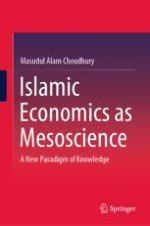2020 | OriginalPaper | Chapter
4. Content Approach to Analytics of Islamic Banks by Meso-economics of Inter-causality
Author : Masudul Alam Choudhury
Published in: Islamic Economics as Mesoscience
Publisher: Springer Singapore
Activate our intelligent search to find suitable subject content or patents.
Select sections of text to find matching patents with Artificial Intelligence. powered by
Select sections of text to find additional relevant content using AI-assisted search. powered by
